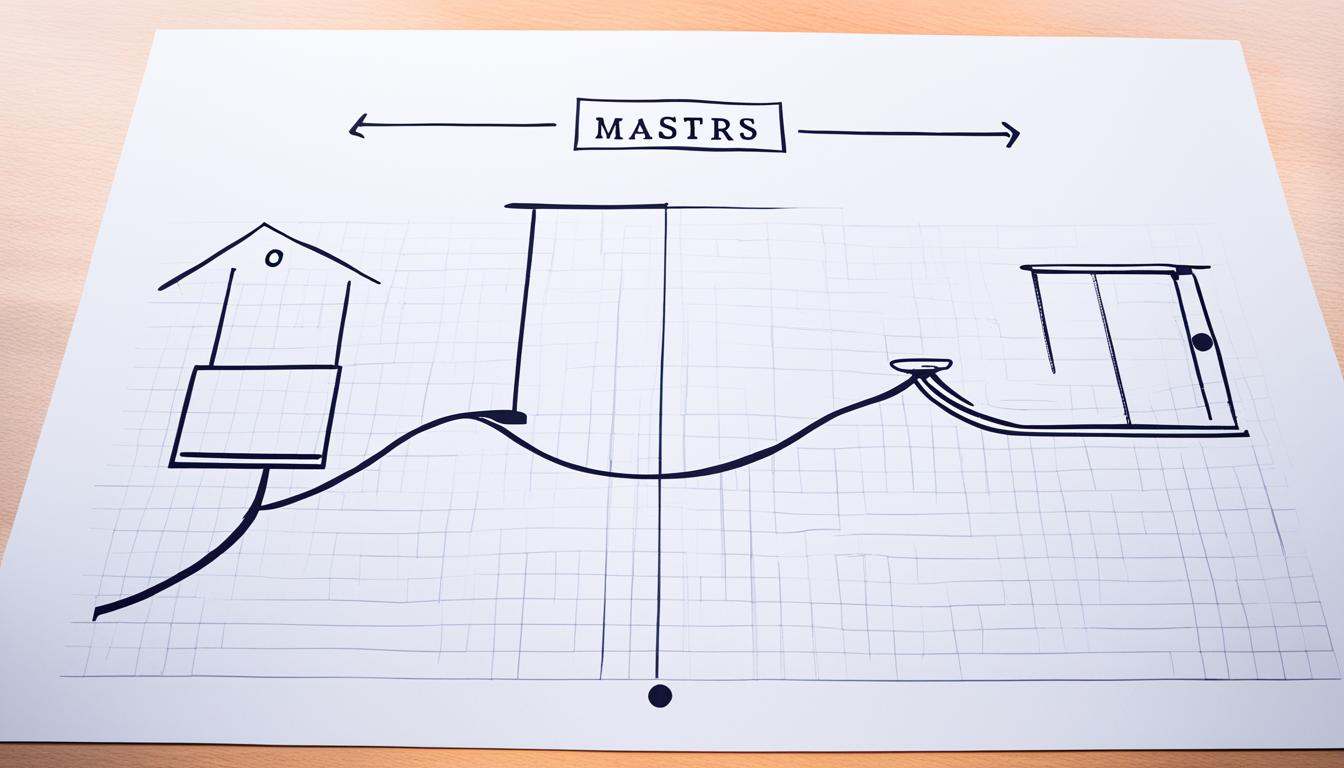Did you know that nearly 2 million students in the United States are currently enrolled in postgraduate programs?
Embarking on the journey of earning a Master’s or PhD degree is a significant decision that demands dedication, perseverance, and a thirst for knowledge. But have you ever wondered if one is harder than the other? Is it more challenging to pursue a Master’s or a PhD?
The answer to this question is not as straightforward as it may seem. The difficulty of a degree program depends on various factors, such as your work ethic, personal abilities, the area of study, the program structure, and the institution. By understanding the differences between Master’s and PhD programs, prospective students can make well-informed decisions and choose the path that best aligns with their goals and aspirations.
Key Takeaways:
- The difficulty of a Master’s or PhD program depends on various factors.
- Master’s programs typically involve coursework, exams, and a dissertation, while PhD programs focus more on independent research and a substantial thesis.
- Master’s degrees offer benefits such as career advancement, specialization, and a shorter completion time.
- Pursuing a PhD provides opportunities for original research, expert status, and a potential career in academia.
- Deciding between a Master’s and PhD requires considering career goals, personal interest, and the level of commitment.
The Differences Between Master’s and PhD Programs
In your journey through higher education, you will encounter various options for advanced study. Two popular choices are pursuing a Master’s degree or a Ph.D. Understanding the differences between these programs can help you make an informed decision based on your academic experiences and career goals.
Coursework vs Research
One of the main distinctions between Master’s and Ph.D. programs lies in the focus of study. A Master’s degree typically emphasizes coursework, where you engage in a structured curriculum tailored to your field of interest. Courses provide necessary knowledge and skills in a specific area, and your learning experience is guided by professors and mentors.
On the other hand, a Ph.D. program centers around original research. As a Ph.D. candidate, you will delve deep into your chosen field, investigating complex problems and making a significant contribution to knowledge. A substantial thesis, which showcases your research findings, is the cornerstone of a Ph.D. program.
Program Duration
Another significant difference is the duration of the programs. A Master’s degree typically takes one to two years of full-time study to complete, providing an efficient path to advanced knowledge and specialization. Conversely, a Ph.D. program demands more time and dedication, typically spanning five to six years or longer. The extended duration allows Ph.D. candidates to immerse themselves in extensive research and develop expertise in their chosen area.

Academic Independence
Master’s programs involve structured guidance and mentorship from faculty members as students progress through their coursework and dissertation. In contrast, Ph.D. candidates are expected to work more independently, taking ownership of their research projects and demonstrating the ability to lead in their field of study.
This higher level of academic independence in a Ph.D. program provides students with the opportunity to develop critical thinking, problem-solving, and research skills necessary for a career in academia or specialized industries.
Thesis vs Dissertation
A Master’s degree typically culminates in the completion of a dissertation, where you demonstrate your understanding of the coursework and apply your knowledge to a specific research project. The dissertation is a comprehensive document that showcases your ability to analyze, synthesize, and present information in a structured manner.
In contrast, a Ph.D. program requires candidates to undertake a substantial research project resulting in a thesis. Your thesis must make an original contribution to your field of study, demonstrating an in-depth understanding of the subject matter and showcasing your intellectual capabilities.
Understanding the differences between Master’s and Ph.D. programs allows you to make an informed decision when choosing the path that aligns best with your academic aspirations and career goals. Whether you prefer a structured coursework or a research-intensive program, both options offer unique opportunities for personal and professional growth.
Challenges in Master’s and PhD Programs
Embarking on a Master’s or PhD program presents its own set of challenges that students must navigate. While both degrees require dedication and perseverance, the specific challenges differ between the two.
Challenges in Master’s Programs:
- Time Commitment: Master’s programs typically have a shorter duration compared to PhD programs. However, the condensed timeline means students must manage their time efficiently to balance coursework, exams, and dissertation requirements.
- Mental Demands: Master’s programs can be mentally demanding, with coursework and exams requiring deep understanding and critical thinking skills.
- Dissertation: Completing a dissertation is a significant challenge in a Master’s program. It involves conducting original research, analyzing data, and presenting findings coherently.
Challenges in PhD Programs:
- Higher Level of Intellectual Engagement: PhD programs demand a higher level of intellectual engagement compared to Master’s programs. Students must cultivate independent thinking, original research, and contribute new insights to their field of study.
- Emphasis on Independence: PhD programs place more emphasis on independent research, requiring students to set their own research agendas, design experiments, and analyze data autonomously.
- Longer Duration: The longer duration of PhD programs can pose emotional and psychological challenges for doctoral students. Sustained motivation, perseverance, and self-care become essential to overcoming the various hurdles along the journey.
It is important for aspiring graduate students to be aware of these challenges, as they can significantly impact one’s academic and personal life during the pursuit of a Master’s or PhD degree.

Pros and Cons of Pursuing a Master’s Degree
When considering your educational path, pursuing a Master’s degree offers numerous advantages. Let’s explore the pros and cons of obtaining a Master’s degree to help you make an informed decision.
Pros of Pursuing a Master’s Degree
- 1. Career Advancement: A Master’s degree can open doors to higher-level positions and increase your earning potential in your chosen field. Employers often value the specialized knowledge and skills acquired during a Master’s program.
- 2. Specialization: Pursuing a Master’s degree allows you to focus and deepen your knowledge in a specific area of interest. This specialization can make you a sought-after expert in your field.
- 3. Differentiation in the Job Market: In a competitive job market, a Master’s degree can set you apart from other candidates. It demonstrates your commitment to professional growth and dedication to your field.
- 4. Cost-effective Option: Compared to a PhD, pursuing a Master’s degree is often more cost-effective. It typically requires a shorter time commitment and may offer more flexible part-time options, allowing you to balance your studies with work or other obligations.
However, it’s important to consider the potential drawbacks of pursuing a Master’s degree as well.
Cons of Pursuing a Master’s Degree
- 1. Limited Expertise: While a Master’s degree provides in-depth knowledge in a specific area, it may not offer the same level of expertise as a PhD. If you’re interested in becoming a leading authority in your field or conducting advanced research, a Master’s degree may not provide the necessary depth.
- 2. Limited Opportunities in Research and Academia: If your career goals involve conducting independent research or pursuing a career in academia, a Master’s degree may not provide the same opportunities as a PhD. Doctoral programs often emphasize research and offer more avenues to contribute to your field.

Consider your career objectives, personal interests, and the level of expertise you aim to achieve when deciding whether to pursue a Master’s degree. It’s important to weigh the benefits and drawbacks and choose the educational path that aligns best with your long-term goals.
Pros and Cons of Pursuing a PhD
When considering furthering your education, pursuing a PhD offers a multitude of benefits that can enhance your career and intellectual growth.
Pros of Pursuing a PhD
- Research Opportunities: A PhD allows you to immerse yourself in extensive research and contribute original findings to your field of study.
- Expert Status: Earning a PhD establishes you as an expert in your chosen area, attracting recognition and respect from peers in academia and beyond.
- Career in Academia: With a PhD, you can pursue a rewarding career in academia, teaching and mentoring future generations of scholars.
By engaging in rigorous academic pursuits, a PhD program provides opportunities for intellectual growth and the chance to push the boundaries of knowledge.
Cons of Pursuing a PhD
- Time Commitment: Completing a PhD program requires significant time and dedication, often spanning several years of intensive study and research.
- Independent Work: As a PhD candidate, you will be expected to work independently, taking ownership of your research project and managing your time effectively.
- Career Considerations: While a PhD can open doors in academia, it may not be necessary for certain career paths outside of research and teaching.
Despite these challenges, the pursuit of a PhD is a transformative experience that can shape your intellectual growth, establish your expertise, and open doors to exciting career opportunities.
Do You Need a Master’s to Pursue a PhD?
While a Master’s degree is not always necessary to pursue a PhD, it can provide valuable research experience and facilitate a smoother transition into a PhD program. Research experience is essential for success in a doctoral program, and a Master’s degree can provide a solid foundation in this regard. It allows you to develop the necessary skills and knowledge to carry out independent research.
Some universities may require a relevant Master’s degree for admission to their PhD programs, especially in certain fields. In these cases, having a Master’s degree becomes a requirement. On the other hand, there are universities that offer combined Master’s and PhD programs, allowing students to earn both degrees in a streamlined manner.
Gaining research experience through a Master’s degree can give you a competitive edge when applying for a PhD program. It shows your dedication to the field and your ability to conduct rigorous research. Admissions committees often look for candidates with research experience, as it demonstrates your potential for contributing to the academic community.
Additionally, pursuing a Master’s degree before a PhD allows you to explore your chosen field in greater depth. It provides an opportunity to specialize and gain a deeper understanding of your subject area. The coursework and research involved in a Master’s program can help you identify your specific research interests and refine your research question, which is crucial for a successful PhD journey.
It is important to note that the decision to pursue a Master’s degree before a PhD ultimately depends on your individual goals and circumstances. While it can offer advantages, such as research experience and a smoother transition, it may not be necessary or the right path for everyone.

Considerations When Choosing Between a Master’s and PhD
When deciding between a Master’s and PhD, there are several important considerations to keep in mind. Your career goals, personal interests, and level of commitment are crucial factors that can help you make an informed decision.
If you are primarily seeking career advancement or considering a change in your field of expertise, a Master’s degree may be more suitable for you. It offers specialized knowledge and skills that can help you stand out in the job market and advance in your chosen profession.
On the other hand, if you have a deep passion for your field and aspire to contribute original research, a PhD is highly recommended. It provides the opportunity to make significant intellectual contributions to your discipline and pursue a career in academia.
The level of commitment required for each program is also a vital consideration. A Master’s degree typically takes one to two years to complete, while a PhD can span five to six years or longer. The longer duration of a PhD program reflects the rigorous research and independent work required to attain expertise in a specific area.
By aligning your educational goals, personal interests, and career aspirations with the respective programs, you can embark on a path that suits you best. Remember, ultimately, the decision lies in your hands, and it’s essential to choose a degree program that you are passionate about and willing to commit to.
Length and Cost of Master’s and PhD Programs
When considering a Master’s or PhD program, it’s essential to understand the time commitment and financial implications involved. Master’s programs typically take one to two years to complete, providing a relatively shorter duration of study compared to PhD programs. On the other hand, a PhD program can span five to six years or longer, depending on the field of study and the individual’s progress.
While the length of the program is an important factor to consider, it’s equally crucial to factor in the cost of education. Generally, pursuing a PhD tends to be more expensive due to the extended duration. However, it’s worth noting that some PhD programs may offer funding opportunities such as stipends, fellowships, or reduced tuition fees. These options can help alleviate the financial burden associated with pursuing an advanced degree.
When making a decision between a Master’s and PhD, it’s crucial to carefully evaluate both the time commitment and financial considerations. Consider your personal circumstances, long-term goals, and financial resources to make an informed choice.
Salary Differences Between Master’s and PhD Graduates
When considering further education, one important factor to take into account is the potential impact on your future earnings. Numerous studies have shown that individuals with higher degrees tend to have higher earning potential over their lifetime.
While the specific salary differences vary depending on the field of study and career path, it is commonly observed that a PhD degree is often associated with higher salary prospects compared to a Master’s degree. This is particularly true in professions that require advanced expertise and research skills.
However, it is crucial to consider the cost of education and the return on investment when evaluating the potential financial benefits. Pursuing a PhD generally involves a longer time commitment and higher tuition fees, which may impact the short-term financial gain. It is important to carefully weigh these factors against the potential long-term benefits and career opportunities.
Ultimately, the decision to pursue a Master’s degree or a PhD should not be solely based on salary considerations. It is important to assess your personal interests, career goals, and passion for research or specialized knowledge. By aligning these factors with the potential financial rewards, you can make an informed decision that best suits your aspirations and ensures a satisfying and rewarding career.
Conclusion
When it comes to choosing between pursuing a Master’s or PhD, the decision ultimately rests on your individual goals, interests, and career aspirations. Both degrees offer unique benefits and challenges that should be carefully considered. Throughout this article, we have explored the differences between Master’s and PhD programs, the challenges they present, and the pros and cons of each option.
By understanding these factors, you can make an informed decision that aligns with your personal circumstances. Whether you choose to pursue a Master’s degree or a PhD, both paths can lead to personal growth and career advancement. It is important to remember that this decision is a personal one, driven by your own ambitions and aspirations.
As you navigate the choice between a Master’s and PhD, take the time to assess your career goals, interests, and the level of commitment you are willing to dedicate. Consider the unique opportunities each degree offers and how they align with your long-term plans. By carefully weighing these factors, you can choose the right degree that will propel you towards success in your chosen field.
FAQ
Q: Is a Master’s degree harder than a PhD?
A: The difficulty of a Master’s degree versus a PhD is subjective and depends on factors such as work ethic, personal abilities, the area of study, the program, and the institution.
Q: What are the differences between Master’s and PhD programs?
A: Master’s programs are typically one to two years long, focused on coursework and a dissertation. PhD programs are research-focused, requiring an original contribution to the field through a substantial thesis and longer program durations.
Q: What are the challenges in Master’s and PhD programs?
A: Master’s programs involve coursework, exams, and a dissertation, while PhD programs require independent research and have a longer duration, leading to potential emotional and psychological challenges.
Q: What are the pros and cons of pursuing a Master’s degree?
A: Pros of a Master’s degree include career advancement, specialized knowledge, and a cost-effective option. However, it may not provide the same level of expertise or research opportunities as a PhD.
Q: What are the pros and cons of pursuing a PhD?
A: Pros of a PhD include original research contributions, establishing expertise, and career paths in academia. However, it requires a significant time commitment and may not be necessary for certain career paths.
Q: Do you need a Master’s degree to pursue a PhD?
A: While not always necessary, a Master’s degree can provide valuable research experience and make the transition to a PhD program smoother. Some universities may require a relevant Master’s degree for admission.
Q: What should be considered when choosing between a Master’s and PhD?
A: Consider career goals, personal interest, and the level of commitment required for each program. A Master’s degree may be suitable for career advancement or a field change, while a PhD is recommended for those who want to contribute original research and pursue academia.
Q: How long do Master’s and PhD programs take and what are the costs?
A: A Master’s program typically takes one to two years, while a PhD program can take five to six years or longer. The cost of a PhD is generally higher due to the longer duration, although funding opportunities may be available.
Q: What are the salary differences between Master’s and PhD graduates?
A: Generally, individuals with higher degrees have higher earning potential. A PhD is often associated with higher salary prospects compared to a Master’s degree.
Q: What should I consider when making a decision between a Master’s and PhD?
A: Consider individual goals, interests, and career aspirations. Both degrees have unique benefits and challenges, so it’s important to carefully evaluate personal circumstances and make an informed decision.
Source Links
- https://www.discoverphds.com/advice/doctorates/masters-vs-phd
- https://www.uwslondon.ac.uk/phd/phd-harder-than-a-masters-degree/


